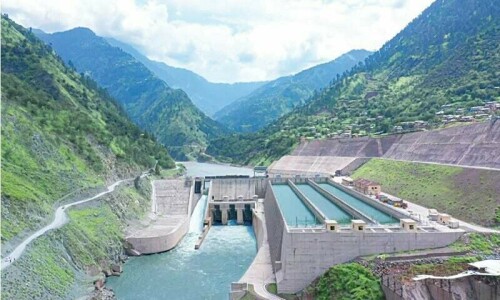LONDON, Aug 23: The five-year anti-dumping duty imposed on Pakistani manufactured goods by the European Union will come to an end next year and the country was hopeful that it would not be re-imposed.
This was stated by Commerce Secretary Syed Asif Shah at a media briefing held at the Pakistan High Commission on the conclusion of his four-nation visit aimed at boosting Pakistan’s trade and commercial ties with leading member countries of the EU.
During his week-long tour the commerce secretary, who was accompanied by Joint Secretary Anjum Bashir, visited Germany, Italy, Spain and UK and held discussions with the officials of these countries on issues relating to improving Pakistan’s trade and gaining market access to EU.
He said the anti-dumping duty was imposed on Pakistan in 2003 to restrict the flow of textile goods into the EU. He said 12 per cent duty was placed on textiles products such as bed linen, bed sheets, curtains, sofa cloth and home textiles.
Shah said despite these duties Pakistan exports around $2 billion textile goods to EU and if the duty is reduced to zero, the country’s trade will go manifold.
Pakistan High Commissioner to the UK Wajid Shamsul Hasan, commercial secretary Saira Najeeb and Press Minister Imran Gardezi were also present on the occasion.
The commerce secretary said Pakistan’s trade with EU was around $10 billion and the EU remains country’s largest trading block. He said the four countries he visited, were the key members of the EU with whom Pakistan has substantial trade links.
The officials he met recognised the need to boost trade with Pakistan and promised to support country’s case for better market access in the 27-member European community.
He said Germany was the only country within EU where Pakistan has a trade imbalance with $1.7 billion imports and $800 million exports. Trade balance is in plus with other three countries, he added.
The commerce secretary explained that the duties were reduced through a system and on the basis of ‘Most Favoured Nation’ (MFN) status for which Pakistan is striving.
He said only USA and EU had GSP (Generalised System of Preferences) and GSP-plus programme. He noted that the US offered the facility of zero duty to certain countries, while EU provides similar facilities to the Least Developed Countries (LDCs) such as Bangladesh, Nepal, Maldives, Sri Lanka and Bhutan.
The secretary stated Pakistan was not in the LDCs category but the country is eager to have Free Trade Agreement with EU as this will help in demand for goods, increase production and develop economic activities.
He said during the course of his discussions he was encouraged by their response and they promised to support Pakistan’s cause in EU.
Shah further said Pakistan was keenly interested in securing GSP plus programme. He said Pakistan was a part of this programme some years ago but this facility was withdrawn when a country, which he did not identify, went into appeal at WTO, which was upheld.
On the question of prospects of FTA with EU, he said EU had linked the free trade agreement to certain conditions, including ratifying and promulgating 27 conventions. “Pakistan has so far ratified and promulgated 24 of these conventions and the remaining three will be implemented soon as the cabinet has given the green signal.”
He said EU was carrying out a study to know whether countries given comfort by EU such as Bangladesh, Sri Lanka, Nepal, and Maldives, had negative impact on Pakistan’s trade or not.
“If the study showed that it had negative impact on Pakistan, then EU will hold negotiations on FTA with Pakistan. The study’s finding will come out next month.”The commerce secretary said EU did not have unlimited capacity for negotiating FTAs because currently, it is doing so with so many different countries and Pakistan has been asked to stand in a queue and come in the pecking order.
“However, we’ve told them not to treat Pakistan as a normal trading partner. We are performing a special role in the region. We need the support perhaps, more than other countries in the region with which EU is negotiating FTA and we told them to fast track FTA with us,” the commerce secretary said.
Responding to a question, he said the government was looking at the complete import profile of Pakistan as the trade gap has increased and there is a need to close it.
The secretary said the government had constituted a committee headed by the chairman Federal Board of Revenue. The report will be presented in the next few days and “we hope that to negate impression that luxury goods were being imported to Pakistan in a large scale”.
On trade with India, he said in the recently announced Trade Policy, the
Indian manufacturers of CNG buses had been asked to invest in Pakistan by setting up plants but no response has been received so far. He said the issue would be taken at the next composite dialogue with India.
He further said the trade balance was in favour of India with Pakistani exports totalling $400 million against $1.3 billion imports from India.
He expressed satisfaction on trade within Safta (South Asian Free Trade
Agreement) countries and said it was focusing on reducing tariffs.
Under the plans, Pakistan and India will reduce tariffs quicker for the LDCs. He said trade had gone up among Safta countries by 15 to 17 per cent in the last two years.--APP












































Dear visitor, the comments section is undergoing an overhaul and will return soon.